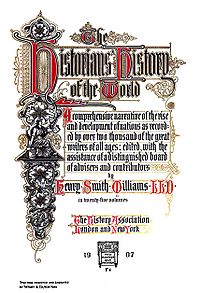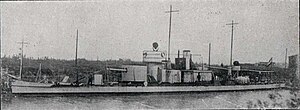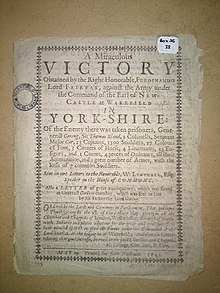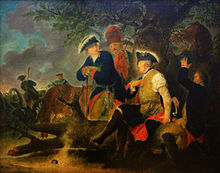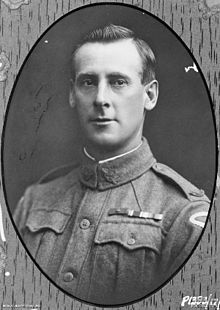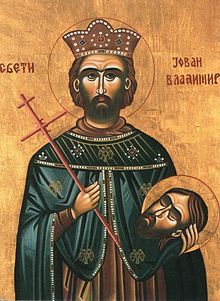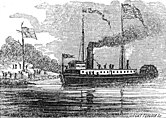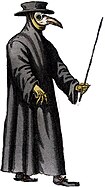Portal:History
The History Portal
History (derived from Ancient Greek ἱστορία (historía) 'inquiry; knowledge acquired by investigation') is the systematic study and documentation of the past. History is an academic discipline which uses a narrative to describe, examine, question, and analyse past events, and investigate their patterns of cause and effect. Historians debate which narrative best explains an event, as well as the significance of different causes and effects. Historians debate the nature of history as an end in itself, and its usefulness in giving perspective on the problems of the present.
The period of events before the invention of writing systems is considered prehistory. "History" is an umbrella term comprising past events as well as the memory, discovery, collection, organization, presentation, and interpretation of these events. Historians seek knowledge of the past using historical sources such as written documents, oral accounts or traditional oral histories, art and material artefacts, and ecological markers.
Stories common to a particular culture, but not supported by external sources (such as the tales surrounding King Arthur), are usually classified as cultural heritage or legends. History differs from myth in that it is supported by verifiable evidence. However, ancient cultural influences have helped create variant interpretations of the nature of history, which have evolved over the centuries and continue to change today. The modern study of history is wide-ranging, and includes the study of specific regions and certain topical or thematic elements of historical investigation. History is taught as a part of primary and secondary education, and the academic study of history is a major discipline in universities.
Herodotus, a 5th-century BCE Greek historian, is often considered the "father of history", as one of the first historians in the Western tradition, though he has been criticized as the "father of lies". Along with his contemporary Thucydides, he helped form the foundations for the modern study of past events and societies. Their works continue to be read today, and the gap between the culture-focused Herodotus and the military-focused Thucydides remains a point of contention or approach in modern historical writing. In East Asia a state chronicle, the Spring and Autumn Annals, was reputed to date from as early as 722 BCE, though only 2nd-century BCE texts have survived. The title "father of history" has also been attributed, in their respective societies, to Sima Qian, Ibn Khaldun, and Kenneth Dike. (Full article...)
Featured picture
Did you know (auto generated)

- ... that Pokémon Scarlet and Violet became the lowest-rated mainline entries in the franchise's history due to performance issues at launch?
- ... that Eli N. Evans authored three books about the culture and history of Jews in the American South?
- ... that during the first tour to the Soviet Union by any American ballet company, Lupe Serrano danced the first encore in the American Ballet Theatre's history?
- ... that pianist and composer Josef Weiss created the first film score in the history of German cinema?
- ... that an Armenian Apostolic Church lawsuit over the Zeytun Gospels led Heghnar Zeitlian Watenpaugh to write a history of its separated canon tables?
- ... that the historical-romance novel My Tender Matador includes a fictionalized version of the attempted assassination of Augusto Pinochet?
Jovan Vladimir or John Vladimir (Serbian Cyrillic: Јован Владимир; c. 990 – 22 May 1016) was the ruler of Duklja, the most powerful Serbian principality of the time, from around 1000 to 1016. He ruled during the protracted war between the Byzantine Empire and the Bulgarian Empire. Vladimir was acknowledged as a pious, just, and peaceful ruler. He is recognized as a martyr and saint, with his feast day being celebrated on 22 May.
Jovan Vladimir had a close relationship with Byzantium but this did not save Duklja from the expansionist Tsar Samuel of Bulgaria, who conquered the principality around 1010 and took Vladimir prisoner. A medieval chronicle asserts that Samuel's daughter, Theodora Kosara, fell in love with Vladimir and begged her father for his hand. The tsar allowed the marriage and returned Duklja to Vladimir, who ruled as his vassal. Vladimir took no part in his father-in-law's war efforts. The warfare culminated with Tsar Samuel's defeat by the Byzantines in 1014 and death soon after. In 1016, Vladimir fell victim to a plot by Ivan Vladislav, the last ruler of the First Bulgarian Empire. He was beheaded in front of a church in Prespa, the empire's capital, and was buried there. He was soon recognized as a martyr and saint. His widow, Kosara, reburied him in the Prečista Krajinska Church, near his court in southeastern Duklja. In 1381, his remains were preserved in the Church of St Jovan Vladimir near Elbasan, and since 1995 they have been kept in the Orthodox cathedral of Tirana, Albania. The saint's remains are considered Christian relics, and attract many believers, especially on his feast day, when the relics are taken to the church near Elbasan for a celebration. (Full article...)
On this day
January 10 Tenth of Tevet (Judaism, 2025)
- 236 – Pope Fabian, said to have been chosen by the Holy Spirit when a dove landed on his head, began his papacy.
- 1812 – New Orleans (pictured), the first steamship on the Mississippi River, arrived at New Orleans to complete its maiden voyage.
- 1929 – Tintin in the Land of the Soviets, the first volume of The Adventures of Tintin by the Belgian cartoonist Hergé, began serialisation.
- 1993 – The Braer Storm, the strongest extratropical cyclone ever recorded in the North Atlantic, reached peak intensity.
- Georg Forster (d. 1794)
- Hrithik Roshan (b. 1974)
- Yip Pin Xiu (b. 1992)
- Constantine II of Greece (d. 2023)
Selected quote
Fortune, which has a great deal of power in other matters but especially in war, can bring about great changes in a situation through very slight forces.
— Julius Caesar, Roman consul
Related portals
More Did you know...
- ... that Giovanni de Ventura, a plague doctor who may have worn a beak doctor costume (pictured), was restricted by a covenant to treat only infectious patients? In the nose of the mask, there were types of plants that were used to filter the sickness from the wearer.
- ... that in some archaic Greek alphabets, an Ε could look like a Β, a Β like a C, a Γ like an Ι, an Ι like a Σ, or a Σ like an Μ?
- ... that the Chinese government has published a list of sixty-four important cultural relics that are forbidden to be exhibited outside of China?
- ... that the 1886 novel Albertine expedited the abolition of public prostitution in Norway?
- ... that Carl Sagan worked with the US Air Force on detonating a nuclear device on the Moon?
- ... that Olympic gold medals have been made out of silver, jade, and glass?
- ... that in 1945 a Japanese battalion was rearmed to serve alongside the British 5th Parachute Brigade in the Far East?
- ... that Solomon was accidentally castrated as an infant?
Topics
Categories

History • By period • By region • By topic • By ethnic group • Historiography • Archaeology • Books • Maps • Images • Magazines • Organizations • Fictional • Museums • Pseudohistory • Stubs • Timelines • Chronology • People • Wikipedia historians
WikiProjects
![]() WikiProject History •
Ancient Near East • Australian History • Classical Greece and Rome • Dacia • Former countries • History of Canada • Chinese history • European history • Heraldry and vexillology • Indian history • Jewish history • Medieval Scotland • Mesoamerica • Military history • Middle Ages • History of Science
WikiProject History •
Ancient Near East • Australian History • Classical Greece and Rome • Dacia • Former countries • History of Canada • Chinese history • European history • Heraldry and vexillology • Indian history • Jewish history • Medieval Scotland • Mesoamerica • Military history • Middle Ages • History of Science
WikiProject Time • Days of the Year • Years
WikiProject Biography • Composers • Political figures • Saints • United States Presidents
Things you can do
 |
Here are some tasks awaiting attention:
|
Associated Wikimedia
The following Wikimedia Foundation sister projects provide more on this subject:
-
Commons
Free media repository -
Wikibooks
Free textbooks and manuals -
Wikidata
Free knowledge base -
Wikinews
Free-content news -
Wikiquote
Collection of quotations -
Wikisource
Free-content library -
Wikiversity
Free learning tools -
Wiktionary
Dictionary and thesaurus

